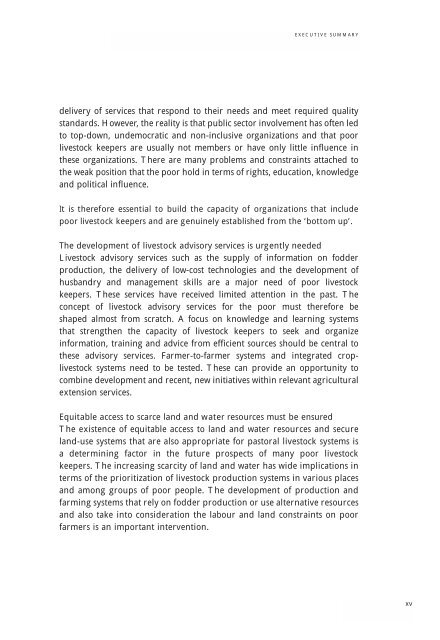Livestock Services and the Poor: A global initiative - IFAD
Livestock Services and the Poor: A global initiative - IFAD
Livestock Services and the Poor: A global initiative - IFAD
You also want an ePaper? Increase the reach of your titles
YUMPU automatically turns print PDFs into web optimized ePapers that Google loves.
E XECUTIVE SUMMARY<br />
delivery of services that respond to <strong>the</strong>ir needs <strong>and</strong> meet required quality<br />
st<strong>and</strong>ards. However, <strong>the</strong> reality is that public sector involvement has often led<br />
to top-down, undemocratic <strong>and</strong> non-inclusive organizations <strong>and</strong> that poor<br />
livestock keepers are usually not members or have only little influence in<br />
<strong>the</strong>se organizations. There are many problems <strong>and</strong> constraints attached to<br />
<strong>the</strong> weak position that <strong>the</strong> poor hold in terms of rights, education, knowledge<br />
<strong>and</strong> political influence.<br />
It is <strong>the</strong>refore essential to build <strong>the</strong> capacity of organizations that include<br />
poor livestock keepers <strong>and</strong> are genuinely established from <strong>the</strong> ‘bottom up’.<br />
The development of livestock advisory services is urgently needed<br />
<strong>Livestock</strong> advisory services such as <strong>the</strong> supply of information on fodder<br />
production, <strong>the</strong> delivery of low-cost technologies <strong>and</strong> <strong>the</strong> development of<br />
husb<strong>and</strong>ry <strong>and</strong> management skills are a major need of poor livestock<br />
keepers. These services have received limited attention in <strong>the</strong> past. The<br />
concept of livestock advisory services for <strong>the</strong> poor must <strong>the</strong>refore be<br />
shaped almost from scratch. A focus on knowledge <strong>and</strong> learning systems<br />
that streng<strong>the</strong>n <strong>the</strong> capacity of livestock keepers to seek <strong>and</strong> organize<br />
information, training <strong>and</strong> advice from efficient sources should be central to<br />
<strong>the</strong>se advisory services. Farmer-to-farmer systems <strong>and</strong> integrated croplivestock<br />
systems need to be tested. These can provide an opportunity to<br />
combine development <strong>and</strong> recent, new <strong>initiative</strong>s within relevant agricultural<br />
extension services.<br />
Equitable access to scarce l<strong>and</strong> <strong>and</strong> water resources must be ensured<br />
The existence of equitable access to l<strong>and</strong> <strong>and</strong> water resources <strong>and</strong> secure<br />
l<strong>and</strong>-use systems that are also appropriate for pastoral livestock systems is<br />
a determining factor in <strong>the</strong> future prospects of many poor livestock<br />
keepers. The increasing scarcity of l<strong>and</strong> <strong>and</strong> water has wide implications in<br />
terms of <strong>the</strong> prioritization of livestock production systems in various places<br />
<strong>and</strong> among groups of poor people. The development of production <strong>and</strong><br />
farming systems that rely on fodder production or use alternative resources<br />
<strong>and</strong> also take into consideration <strong>the</strong> labour <strong>and</strong> l<strong>and</strong> constraints on poor<br />
farmers is an important intervention.<br />
xv

















